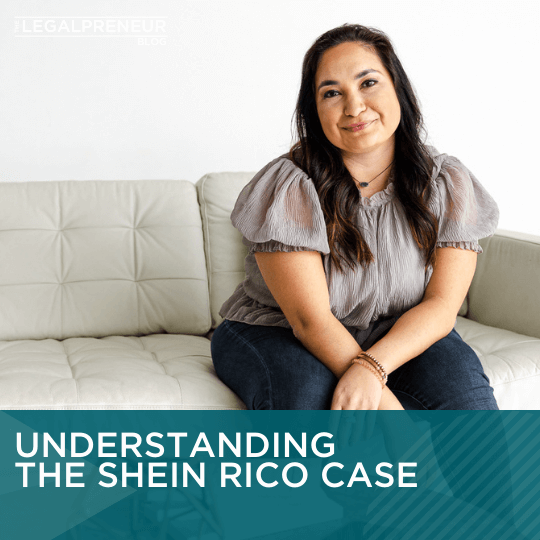*The information below is not legal advice. To procure legal advice, become a Legalpreneur Member*
Recently, fashion retailer SHEIN has found itself caught up in a legal battle over alleged racketeering activities. The case, filed in the United States District Court for the Southern District of New York, has raised concerns among SHEIN customers and the fashion industry as a whole. SHEIN and similar companies have provided nothing but problems for small businesses due to the practices of these companies, which we will dive into later in this post.
What is the RICO Act?
The Racketeer Influenced and Corrupt Organizations (RICO) Act is a federal law that was enacted in 1970. It was designed to combat organized crime by targeting the individuals and organizations that engage in these activities. Among other things, the RICO Act provides for both criminal and civil penalties for those found guilty of belonging to a racketeering organization. Normally, matters like this would be brought under a copyright infringement case. However, because the acts of SHEIN are so egregious, it amounts to more than just copyright infringement.
The SHEIN Case
In the case against SHEIN, the plaintiffs allege that the company engaged in racketeering activities by knowingly selling clothing items that infringed on intellectual property owned by other companies. The plaintiffs further allege that SHEIN engaged in this activity on a large scale and that it damaged the plaintiffs’ businesses.
Essentially this is the business model of SHEIN – find popular items online and sell exact copies of the items, even those that are protected under different forms of intellectual property (patents, trademarks, and copyrights).
This has been an ongoing problem for many years for small businesses. SHEIN is not the first company to have this model. However, it is most likely the first case of its kind to be brought under the RICO Act.
The case is still ongoing, and SHEIN has denied the allegations. The judge has not yet ruled on the case, and it remains to be seen what the ultimate outcome will be.
Before the SHEIN Case
Before this case, small businesses faced a number of issues when companies operated under this model: (1) the small business didn’t know anything wrong had been done, (2) if the small business knew it was wrong, they didn’t know how to go about obtaining a remedy, and (3) even if the small business knew how to obtain a remedy, hiring an attorney to fight this matter could be more costly than any remedy available.
For these reasons, most small businesses would ignore the issue or simply not make it far enough in the process to bring light to the issue for other small businesses.
As a former clothing boutique owner turned small business attorney, I can’t even begin to tell you how many boutique owners have had their photos or designs stolen by companies similar to SHEIN, such as Temu, Bellelily, and the like.
This is not a new issue, but I am hopeful this is the beginning of the end of this model.
Implications for the Fashion Industry
Regardless of the outcome of the case, the SHEIN RICO case raises concerns about intellectual property rights and the fashion industry as a whole. Companies must take great care to ensure that the products they sell do not infringe on the trademarks, copyrights, or other intellectual property of other businesses. Failure to do so can result in costly legal battles and damage to a company’s reputation.
At the same time, it is important for companies to be able to compete in the marketplace by creating innovative designs and products. Striking the right balance between innovation and respect for intellectual property rights is a challenge that the fashion industry will continue to face in the years ahead.
If you’re a small business reading this, it is not likely that you would face a RICO case. If you use photos or designs that you did not create, you are likely to face a copyright infringement case. However, as long it is not a repeated issue on your end, a RICO case is not likely in your future. If you have questions regarding what’s okay to do and what’s not okay, check out our Legalpreneur Membership. This membership provides you all-access to your own attorney
Conclusion
The SHEIN RICO case is an important reminder of the importance of intellectual property rights and the consequences of engaging in racketeering activities. As the fashion industry continues to evolve, it is important for companies to be mindful of these issues and to take steps to ensure that they are acting ethically and responsibly. Only then can the industry continue to thrive and provide consumers with the products they want and need.
*The information in this article is not legal advice*

